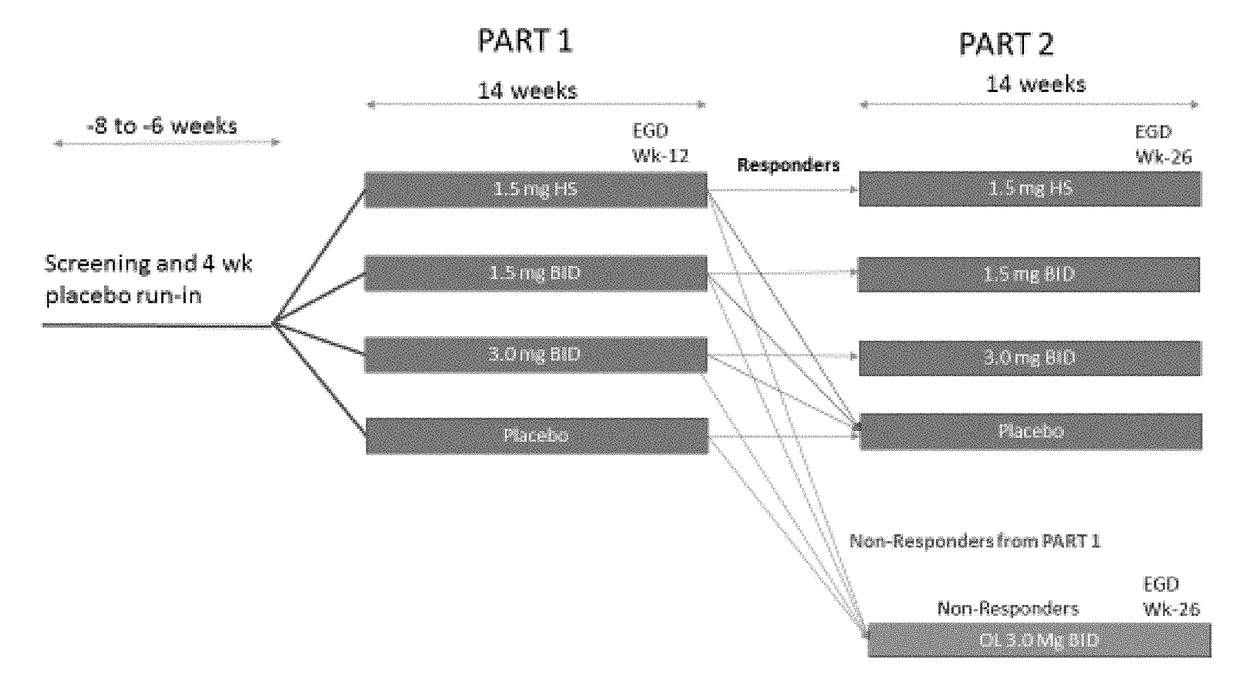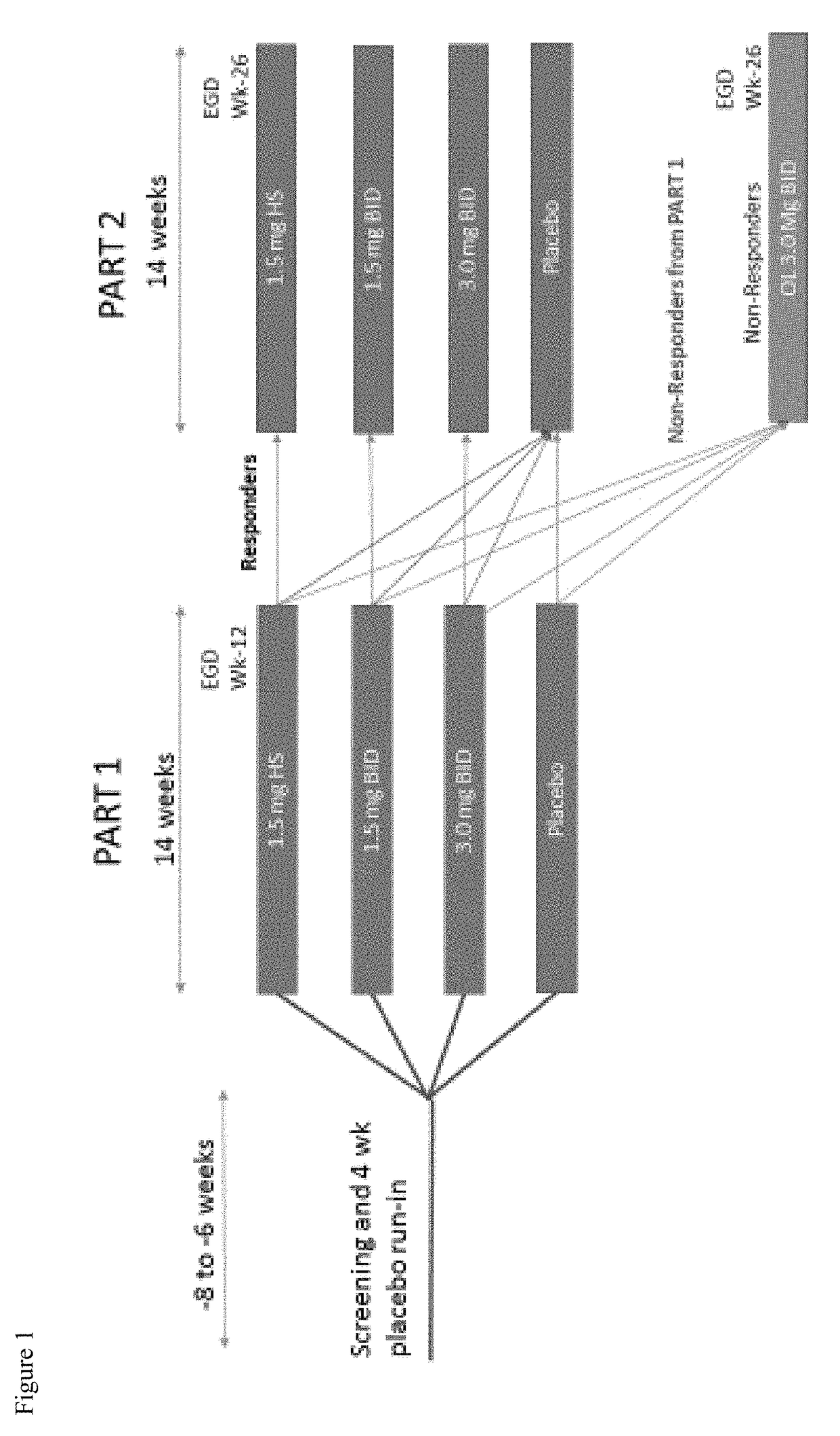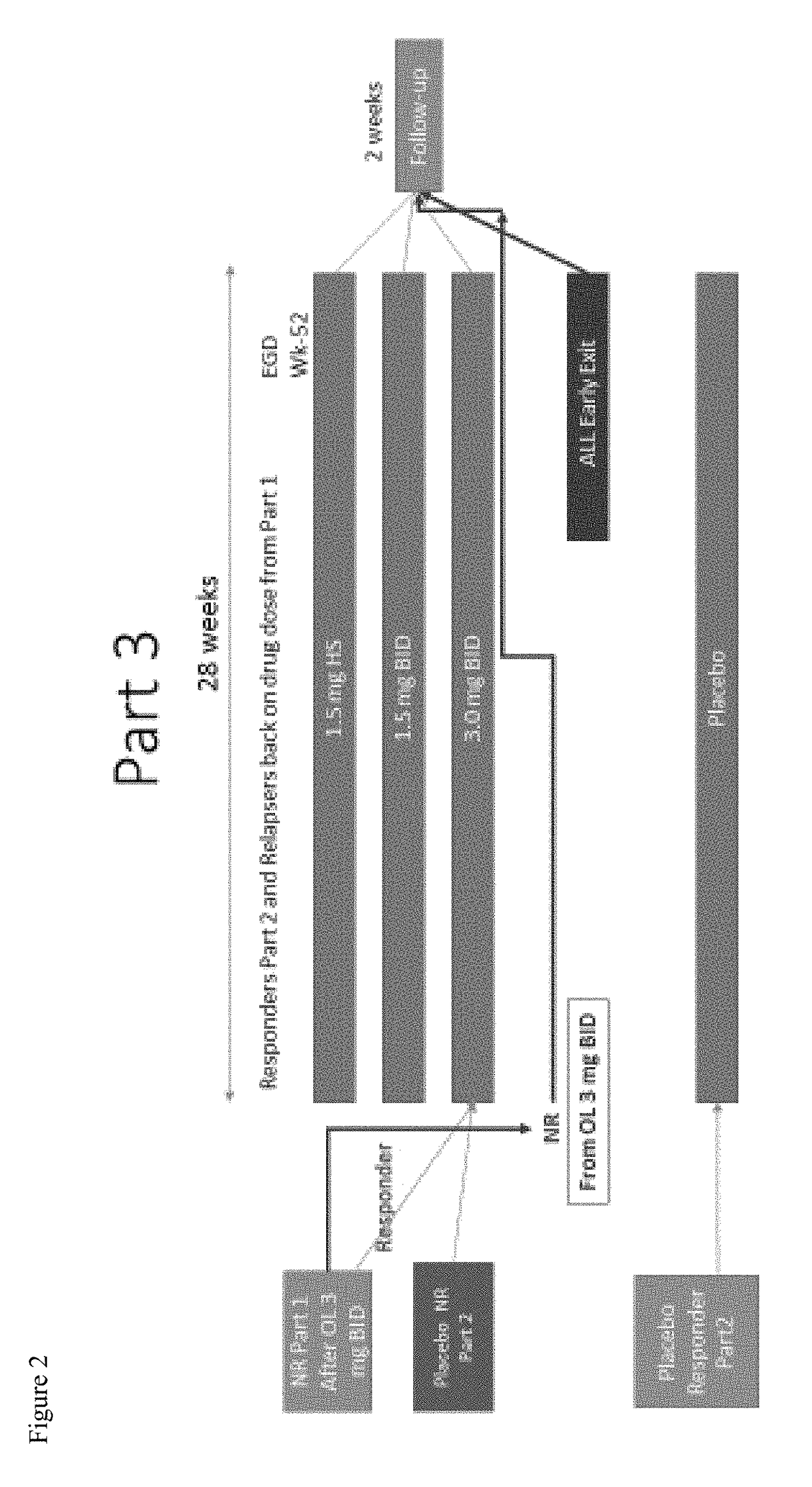Methods of treating eosinophilic esophagitis
a technology of eosinophilic esophagitis and treatment methods, which is applied in the field of treatment methods of eosinophilic esophagitis, can solve the problems of delayed treatment of eosinophilic patients, difficulty in swallowing, and predisposing patients to other complications, so as to improve esophageal function and morphology, improve the peak eosinophilic count, and improve the effect of eosinophili
- Summary
- Abstract
- Description
- Claims
- Application Information
AI Technical Summary
Benefits of technology
Problems solved by technology
Method used
Image
Examples
example 1
A Randomized, Double Blind Dose-Ranging Study of Fluticasone Propionate Oral Dissolving Tablet
[0231]This Phase 2b study will enroll 320 patients with eosinophilic esophagitis (EoE) between the ages of 14-75. To be eligible for the study, patients must have a diagnosis of EoE (>15 peak eosinophil per HPF) after proven failure of 8 weeks or more of high-dose (i.e. 40 mg BID esomeprazole) proton pump inhibitor (PPI). PPI therapy may be continued during the study only if the subject was on PPI therapy at the time of enrolling in the study. No new initiation of, nor alteration of PPI therapy is allowed during the study. Subjects must also be symptomatic and have a 7-day recall Global EoE symptom score of ≥5 and a 7-day recall EEsAI score of >20 to enter the placebo run-in, and an increased EEsAI score based upon a daily diary.
[0232]Primary Objectives: To evaluate the efficacy of fluticasone propionate oral disintegrating tablet (APT-1011) in adolescents and adults with eosinophilic esoph...
example 2
A randomized, Double-Blind, Placebo-Controlled Trial of a Fluticasone Propionate Orally Disintegrating Tablet in Adult and Adolescent Patients with Eosinophilic Esophagitis: A Phase 1 / 2a Safety and Tolerability Study
[0297]BACKGROUND & AIMS: Eosinophilic esophagitis (EoE) is a chronic immune-mediated disease characterized by presence of tissue eosinophilia and symptoms of esophageal dysfunction. This was the first clinical study of APT-1011, fluticasone propionate (FP) a novel orally disintegrating tablet (ODT), that evaluated the tolerability and safety of 2 dosing regimens of APT-1011 compared to placebo (PBO) in adolescent and adult EoE patients.
[0298]METHODS: Subjects were randomized 1:1:1 to receive either APT-1011 1.5 mg BID [BID] (n=8), APT-1011 3.0 mg QD [QD] (n=8), or PBO (n=8). Patients underwent esophago-gastro-duodenoscopy (EGD) with esophageal biopsy at baseline (BL) and end of treatment [EOT] (week 8) to assess change in median eosinophil count. Secondary endpoints incl...
example 3
A Randomized, Double-Blind, Placebo-Controlled, Dose-Ranging, and Maintenance Study of APT-1011 in Adolescents and Adults with Eosinophilic Esophagitis (EoE)
[0302]Primary Objective: Evaluate the efficacy of APT-1011 in adolescents and adults with eosinophilic esophagitis (EoE).
[0303]Secondary Objectives: To evaluate the safety of APT-1011 in adolescents and adults with EoE; To define the dose-response of APT-1011; To select a dose(s) for Phase 3; To evaluate individual pharmacokinetics of APT-1011 in a subset of adults and adolescents with EoE; To evaluate the population pharmacokinetics (PopPK) of APT-1011 in patients with EoE; Evaluate maintenance of efficacy and long-term safety; To evaluate the effects on endoscopic appearance using the EoE Endoscopic Reference Score (EREFs) (Hirano 2015; van Rhijn 2014); Evaluate change from baseline of the 7-day EEsAI and Global EoE Symptom Score.
[0304]Safety Objectives: To determine the safety profile of acute and chronic administration of FP...
PUM
 Login to View More
Login to View More Abstract
Description
Claims
Application Information
 Login to View More
Login to View More - R&D
- Intellectual Property
- Life Sciences
- Materials
- Tech Scout
- Unparalleled Data Quality
- Higher Quality Content
- 60% Fewer Hallucinations
Browse by: Latest US Patents, China's latest patents, Technical Efficacy Thesaurus, Application Domain, Technology Topic, Popular Technical Reports.
© 2025 PatSnap. All rights reserved.Legal|Privacy policy|Modern Slavery Act Transparency Statement|Sitemap|About US| Contact US: help@patsnap.com



